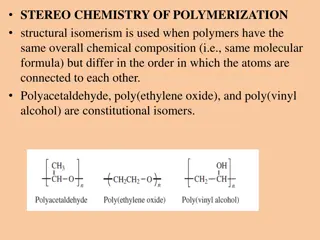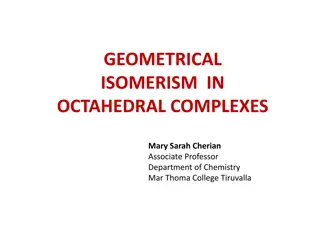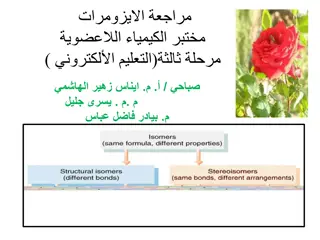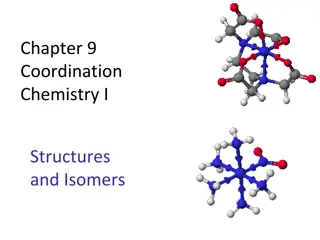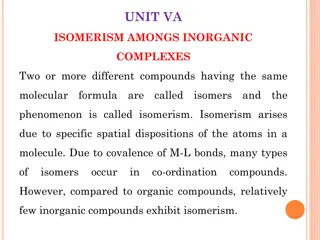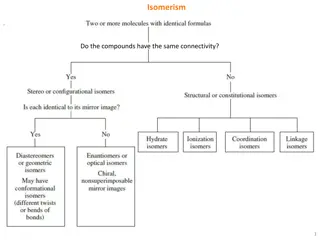Understanding Geometric Isomerism in Chemistry
Explore the concept of geometric isomerism with a focus on cis and trans isomers in organic compounds. Learn about different types of isomerism and the significance of geometrical arrangements in chemical structures. Discover how isomers differ and their impact on compound properties. Engage in inte
0 views • 9 slides
Stereochemistry and Isomerism in Polymerization
Structural isomerism plays a crucial role in polymer chemistry by distinguishing polymers with the same molecular formula but different atom connectivity. Isomeric polymers can stem from different monomers or polymerization routes, resulting in variations in properties. Stereoisomerism, on the other
1 views • 36 slides
Quantum Mechanics of Hydrogen Molecule Rotations
Dive into the intriguing world of molecular rotations in hydrogen molecules, exploring topics such as rotational heat capacity, moment of inertia, nuclear spin isomers, and wave number calculations. Understand the implications of particle interactions, distinguishable vs. indistinguishable particles
0 views • 23 slides
Understanding Stereochemistry: Isomers and Their Properties
Stereochemistry explores the fascinating world of isomers, including stereoisomers, geometric isomers, and structural isomers. Stereoisomers have the same molecular formula but differ in spatial arrangement, while geometric isomers lack free rotation around bonds. Structural isomers like dimethyl et
0 views • 27 slides
Exploring Smells: Molecules and Properties in Chemistry
Dive into the world of molecular structures and smells in chemistry with a focus on distinguishing between molecules with the same formula but different properties. Understand the significance of structural formulas, recognize isomers, and predict the smells of new molecules based on their chemical
2 views • 13 slides
Geometrical Isomerism in Octahedral Complexes: A Comprehensive Overview
Geometrical isomerism in octahedral complexes is a fascinating phenomenon arising from different geometric arrangements of ligands. This type of isomerism is prevalent in coordination numbers 4 and 6, leading to two main types of geometric isomers. Examples of cis-trans and mer-fac isomers in MA2B4
5 views • 10 slides
Understanding Geometrical Isomers in Potassium Chromate Complexes
Explore the preparation methods, crystal shapes, and properties of cis and trans isomers of potassium chromate complexes. Learn about the use of oxalic acid and potassium dichromate, compare the two isomers, and understand the oxidation and reduction reactions involved.
3 views • 8 slides
Insights into Seniority Isomers in Nuclear Physics
Explore the concept of seniority isomers in nuclear physics, delving into topics like semi-magic isomers, alignment properties of intruder orbitals, and the role of seniority mixing. Discover the significance of Z=50, N=82 isomers and the structural properties associated with them. Uncover the essen
0 views • 21 slides
Understanding Coordination Chemistry: Structures, Isomers, and Naming
Exploring coordination chemistry involves understanding structures, isomers, naming conventions, and common coordination numbers, all essential in studying coordination compounds. Coordination compounds consist of central metals, ligands, and charge balancing ions. Naming involves listing cations, l
0 views • 46 slides
Isomerism in Inorganic Complexes: A Comprehensive Overview
Isomerism in inorganic complexes is a fascinating phenomenon arising from the specific spatial arrangements of atoms within molecules. This article delves into the types of isomerism found in coordination compounds, such as structural isomerism and stereoisomerism. The importance of studying isomers
0 views • 67 slides
Understanding Alkanes and Alkenes in Organic Chemistry
Explore the properties and reactions of decane, catalysts, isomers, and addition reactions of alkenes in this comprehensive guide. Learn about saturated and unsaturated hydrocarbons and witness the transformation from alkenes to alkanes through different chemical processes.
0 views • 18 slides
Understanding Coordination Complexes and Transition Metals
Today's lecture covers transition elements, coordination complexes, ligand types, geometries, naming, isomers, and bonding in coordination complexes. Transition metals form coordination complexes with metal ions, ligands, and counter ions. The types of ligands include monodentate and bidentate ligan
0 views • 24 slides
Understanding Stereoisomerism in Chemistry
Stereoisomerism is a key concept in chemistry where compounds have the same atoms and bonds but differ in the orientation of these bonds. It includes cis-trans isomerism, fac-mer isomerism, and optical isomers, with examples and illustrations provided to enhance understanding. Chirality plays a cruc
0 views • 9 slides
Understanding Boiling Points and Intermolecular Forces
Exploring the relationship between intermolecular forces and boiling points, this content discusses trends and anomalies in boiling points of halogens, isomers with the same molecular formula, molecules with similar Mr, and polar molecules. It explains how molecular size, structure, and interactions
0 views • 5 slides

